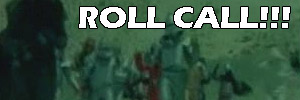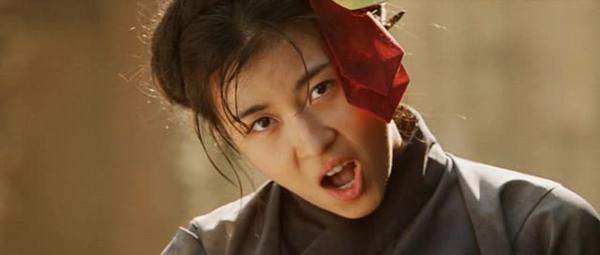Duelist
aka 형사 aka Hyeongsa

2005![]()
Written by Lee Myung-se and Lee Hae-kyeong
Based on the comic by Bang Hak-ki
Directed by Lee Myung-se

Stylish visuals and Ha Ji-won can’t save Duelist from the horrors of mediocrity. They try so hard! But close only counts with horseshoes and hand grenades. Duelist suffers a few too many flaws to for me to recommend it, though I can appreciate the type of film it was trying to be. It’s an anachronistic tale of ancient detectives working against an attempted coup plotted against the Korean king, complete with stylized visuals that will remind you of MTV editing. But it’s actually a film about two people connecting, people on opposite sides of a conflict. And the tragedy that results. This is a Korean film, after all!
As longtime readers (all 3 of you) know, I’m a sucker for crazy visualizations in film. Especially when they’re integrated so well into the film they become indispensable. Parts of Duelist achieve this goal. But other parts do not, the visuals become a distraction at best, and a problem at worst. There are lots of scenes that transition not by normal cuts, but instead by the camera sweeping into the new scene and the old scene becomes the new. That was neat. I wasn’t so keen on the montages that features a lot of scenes fading in and out, but parts never fully fading in, just imprinting on the scene. It seemed more like the film was trying to remind us of what the characters were feeling and thinking about, even though we should know just by virtue of paying attention.

Duelist takes its music queues from throughout the world and throughout time, so European circus tunes and classic Korean music are both used to set whatever mood is needed. Even the noises of crowds cheering are dubbed in despite a lack of such crowds, to make us know that an action is worth our admiration.
The action scenes work well when it’s limited to two combatants, but the larger battle sequences don’t feature the drama and intimacy of the film’s duels (and the intimacy isn’t helped by the larger sequences featuring lots of overhead shots of crowds instead of shots in the battles. Lee Myung-se does his preferred smaller fights with a mix of slow-motion and sped-up choreography, which both shows off the dueling as a loving slow dance, and as a wild and furious clash of emotions. The duels often aren’t about fighting, but have a larger emotional meaning.

Duelist comes from a time when Korean cinema was riding high, atop the world. But that horse was getting tired, and the world is ever-spinning. Bearing that in mind, I still judge Duelist against its contemporary films and the quality of the work that was being released at the time. Duelist does not measure up. Were it released today, it would be regarded as a mini-masterpiece. But in the middle of the shuffle of some of the greatest cinema to come out of the peninsula, Duelist barely registers.


|


Detective Ahn, his protege Detective Namsoon, and the rest of their squad are undercover at a market trying to track the source of a rash of counterfeit coins. They are tracking a one-eyed baddie named Ma the Lizard when the sting gets stymied by a circus performer wearing a metal mask and a white wig. He manages to cause chaos in the crowd and kill all of the counterfeiters before the detectives can catch up with them.
By now the squad realizes something bigger is out there, and thousands of fake coins are now being circulated in multiple cities. In an effort to track down the masked man, they get the only man who could recreate the art of a fake coin out of jail, Hermit Gongan, and he draws a picture of someone who visited him, who turns out to be the masked man.

The detectives start to track him, but their efforts are easily avoided. At night in a maze of a courtyard, the mystery man ambushes Detective Namsoon and demands to know why “he’s” tailing him. They end of fighting, this battle being pretty good. The area they are battling in has a large shadowy patch, and as the two go in and out of that patch while fighting, they disappear and reappear from view. Seeing half of a good choreographed action is way better than seeing the entirety of action that is just a billion random jumpcuts. The music here reminds one of the tango, as the two are more dancing than fighting. The man runs off when he discovers Namsoon is a girl.
The mystery man is Gu Janggon, assistant to the Defense Minister Song Pil-joon. thanks to a more rapid spread in the amount of fake coins and the hyperinflation resulting, suspicion centers on Minister Song. When it turns out his daughter is to be married to the man that is going to be pushed to replace the King, things all fall into place. Despite Namsoon and Ahn’s suspicions, Minister Soon is too powerful for them to just go rummaging around his house for clues. Not even for Blue’s Clues! So they go undercover, which gets them some proof and some awkward interactions between Namsoon and Gu Janggon.
Later the detectives all get ambushed in various places, only Namsoon and Ahn surviving. Namsoon has a drunken emotional fight with Janggon, while Ahn is taken off the case. Hey, they have that trope in Korea!
But the whole “off the case” thing was a ruse where the chief told them a secret meeting time and place, the conspiracy is to take down the King and Song’s daughter is to marry the new king. Evidence in hand, cops swarm the place and all the bad guys end up dead, even Gu Janggon.


This affects Namsoon negatively, she becomes more bitter and withdrawn, with flashbacks to earlier scenes of them encountering each other. The usual Korean depressionistic cinema becomes muddled with post-traumatic stress disorder. Her memories and emotions are visualized in a long sequence of the two fighting in the snow in the dark.
Yes, we know, it was love, two souls connecting. Even though they only barely knew each other and their chemistry together was rough at best. Most of their memories together were barely the type of things you laugh over, but at least this swordplay is showing off the literal dancing together as lovers aspect I mentioned earlier (the point is even mentioned by the film!), and gives us some good fight choreography.
We’re left knowing that Namsoon is forever changed by her encounter with Gu Janggon, and she’ll see him wherever she goes.


While Duelist gives us some good scenes and characters, the overall story seems more stifled, and the post-Gu death sequences go on far longer than I though they would. Often to the point of absurdity. I was reminded of the ending sequence of Barb Wire, where it’s just Pam Anderson dancing for what seems like 20 minutes. While I appreciate the attempt to shake up the Korean style of cinema and make it more visually stimulating, somewhere along the way they forgot to bring the good storytelling. A missed chance at greatness.



Rated 6/10 (Fairy, statue, bearded, mangaed, momentoed, faced)
Please give feedback below!









One Comment
Pingback:
October 24, 2012 at 10:11 am